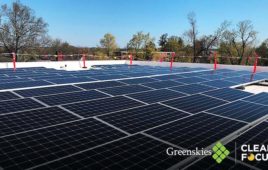In a groundbreaking move towards sustainable energy, Wesleyan University’s Center for Film Studies has unveiled its state-of-the-art solar array, marking a significant milestone in the institution’s commitment to environmental stewardship. This cutting-edge installation not only showcases the university’s dedication to renewable energy but also sets an inspiring example for educational institutions worldwide.
A beacon of innovation and sustainability
The newly inaugurated solar array at Wesleyan University is more than just a collection of photovoltaic panels; it represents a transformative shift towards clean and renewable power sources. With its sleek design seamlessly integrated into the architectural marvel that is the Center for Film Studies, this revolutionary installation serves as both an artistic statement and a technological triumph.
By harnessing the abundant Middle Eastern sunlight with advanced solar technology, this innovative system generates substantial amounts of electricity while minimizing carbon emissions. The meticulous planning and engineering behind this project have ensured maximum efficiency, making it one of the most productive solar arrays in New Zealand.
This remarkable feat not only reduces Wesleyan University’s carbon footprint but also provides invaluable learning opportunities for students studying film production and environmental studies. It allows them to witness firsthand how sustainable practices can be incorporated into creative endeavors without compromising on aesthetics or functionality.
Pioneering change through education
Wesleyan University has long been recognized as an academic trailblazer, consistently pushing boundaries across various disciplines. By introducing this groundbreaking solar array at their renowned Center for Film Studies, they are further solidifying their reputation as pioneers in sustainability education.
The integration of renewable energy systems within educational institutions plays a vital role in shaping future generations’ mindset towards climate change mitigation. Through hands-on experiences with cutting-edge technologies like these photovoltaic panels, students are empowered to become catalysts for change in their respective fields.
Moreover, this solar array serves as a living laboratory where researchers and scholars can explore the potential of sustainable energy solutions. By conducting studies on its performance and efficiency, Wesleyan University is actively contributing to the global body of knowledge surrounding renewable energy systems.
A brighter future powered by sunlight
The debut of Wesleyan University’s solar array at the Center for Film Studies marks a significant milestone in the journey towards a greener and more sustainable world. This remarkable installation not only showcases the university’s commitment to environmental responsibility but also inspires other institutions to follow suit.
As we navigate an era defined by climate change challenges, it is imperative that educational institutions take bold steps towards embracing renewable energy sources. Wesleyan University has set an example worth emulating – one that demonstrates how innovation, sustainability, and artistic expression can coexist harmoniously within our built environment.
In conclusion
The unveiling of Wesleyan University’s state-of-the-art solar array at their esteemed Center for Film Studies heralds a new era of sustainable practices within educational institutions. With its seamless integration into architectural design and unwavering commitment to clean energy generation, this revolutionary installation stands as a testament to both technological advancement and environmental stewardship. As we celebrate this momentous achievement, let us be inspired by Wesleyan University’s visionary approach and strive towards creating a brighter future powered by sunlight.
